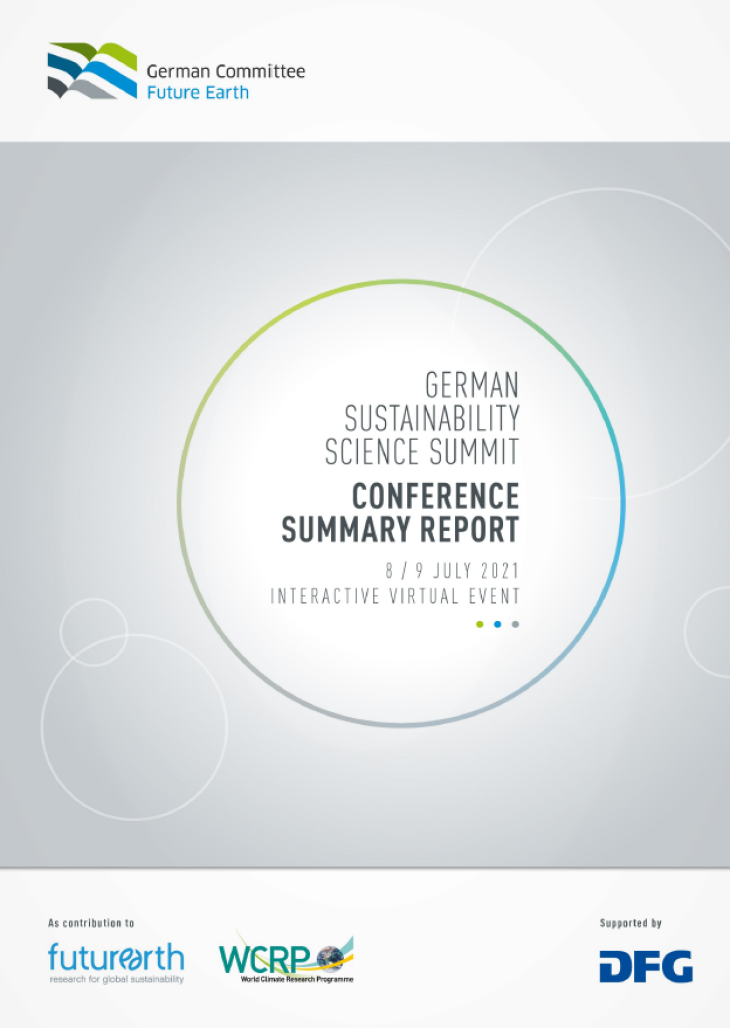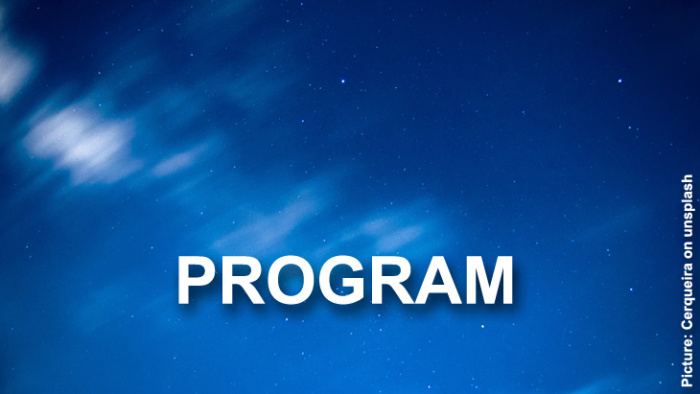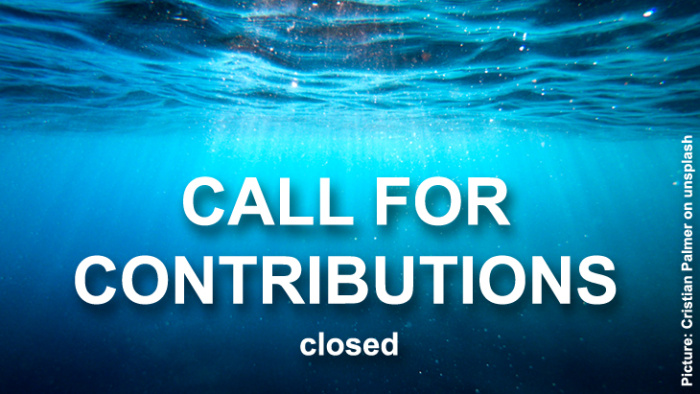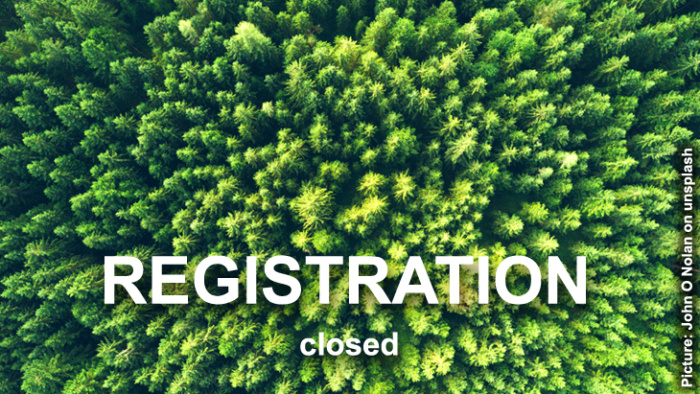German Sustainability Science Summit 2021

Please find the Conference Summary Report here:
G3S21 Conference Summary Report
On 8 and 9 July 2021, the German Sustainability Science Summit 2021 took place for the first time as an interactive online event. The conference continued the series of German Future Earth Summits organised by the German Committee Future Earth (Deutsches Komitee für Nachhaltigkeitsforschung, DKN) and provided a platform for exchange on new scientific findings and research needs in the field of sustainability research.
Around 500 participants from all over the world, most of them based in Germany, had registered for the online event and participated spread over two days. About 150 participants acted as hosts and speakers of the 30 different summit sessions. The summit was preceded by an early-career researcher workshop on opportunities and challenges for early-career scientists in inter- and trans-disciplinary sustainability science.
One important item on the summit program was the discussion of the DKN position paper on central topic areas and open research questions in sustainability research, which was presented by the committee and will now be further developed. Most of the other summit sessions were proposed and set up in response to an open call for session proposals issued in spring 2021. In addition to the sessions with presentations and discussions, the online conference platform enabled networking via various innovative tools.
The DKN would like to thank all participants for their valuable contributions and the fruitful discussions. Please stay tuned for more information on the summit and on follow-up activities.
Previous Summits
Prior to the German Sustainability Science Summit 2021 three German Future Earth Summits have taken place within the bi-annual summit series organised by the German Committee Future Earth (Deutsches Komitee für Nachhaltigkeitsforschung, DKN).
The bi-annual "German Future Earth Summits" contributed to the networking among the sustainability research community in Germany and beyond. They brought together each more than 200 visitors from many disciplines and sectors.
While new societally relevant topics were discussed at the first summit (2014), the second summit (2016) focused on cross-disciplinary and cross-sectional issues with a stronger focus on science. The third summit (2018) took the adoption of the "Sustainable Development Goals" and the “Paris Agreement on Climate Protection” as well as the establishment of the Future Earth Knowledge Action Networks (KANs) as an opportunity to focus on the role of science in the production of solution-oriented knowledge.
3. German Future Earth Summit, Berlin, 08.-09.02.2018
Scientific knowledge is essential to support and improve decision-making that successfully implements the 2030 Agenda and reaches the goals of the Paris Agreement. Considering the tight time scale of these political frameworks, the scientific community is challenged more than ever to provide answers of the world’s biggest societal and environmental problems.
Today, science faces three big challenges (1) assessing and communicating the science generated over the past 20 years, (2) defining and closing knowledge gaps, and (3) generating (new) knowledge together with relevant societal actors in the context of global sustainability.
In addition to national and regional approaches some challenges benefit from international networks advanced by WCRP and Future Earth. The first German Future Earth Summit focused on new areas for integrated science for Germany; the second Summit addressed the cross-cutting issues around theory, data and assessment while this third Summit will focus on Knowledge-Action Networks (KANs). KANs are expected to create and provide a creative environment for science and stakeholders to advance integrated knowledge generation on global sustainability.
The German Committee Future Earth supports these international efforts and provides a platform for German researchers working on global sustainability. Moreover, the German Committee Future Earth partners with the solution network SDSN-Germany and supports science informed decision-making via the newly established ‘Science Platform Sustainability 2030’. Together with the scientific community we want to develop and explore possible new research directions in Germany and beyond, to advance the idea of global sustainable societies.
Science across the KANs is highly integrated. The KANs will build on fundamental and solution oriented research, and focus on topics such as Health, Natural Assets, Ocean, Sustainable Consumption & Production, Sustainable Development Goals, Transformations, Urban, Water-Energy- Food Nexus, Finance & Economics.
2. German Future Earth Summit, Berlin, 28.-29.01.2016
With around 280 participants the 2. German Future Earth Summit was a great success. Scientists from various disciplines and institutions as well as political and societal actors came together, to exchange views about pressing issues in global sustainability research. In keynote talks, panel discussions and numerous community-initiated and -organized events, the participants discussed about thematic priorities of the German community.
Whereas the 1. German Future Earth Summit addressed Future Earth’s three broad themes Dynamic Planet, Global Development and Transformation towards Sustainability, the second summit focused on the cross-cutting capabilities which are crucial to cultivate for establishing integrative research. Therefore, the discussions thematically revolved around research methods and concepts, measures of human well-being and sustainable development, monitoring systems and environmental monitoring, possibilities of data provisioning as well as the improvement of science-society interactions. Needs that arise in the course of global sustainability research were reviewed and opportunities for further development, including in the context of the national funding landscape, identified.
1. German Future Earth Summit, Berlin, 27.-28.01.2014
To further develop Future Earth in Germany, the German Committee Future Earth (DKN Future Earth) held the first German Future Earth Summit in January 2014. The two-day programme included presentations, panel discussions and workshops. The overall aim was to initiate a dialogue on possible Future Earth research priorities from a German perspective. The summit also set out to foster interdisciplinary collaboration across the natural and social sciences, humanities, economics and engineering, as well as involve policy-makers, funding agencies, industry and other sectors of German civil society. It also provided opportunities to discuss possibilities for collaboration in cross-cutting Future Earth topics such as research methods and concepts, stakeholder involvement, environmental and societal data availability, potential contributions to the UN International Year for Global Understanding and the role of early career scientists.
The German Future Earth Summit was intended to be one of the steps towards the development of a national perspective and roadmap for Future Earth research.
The overwhelmingly positive response of the scientific community gives us confidence that Germany is and will remain a strong supporter of research on global sustainability.





